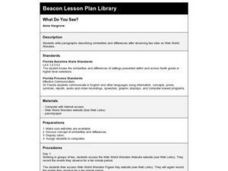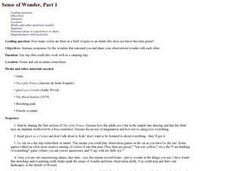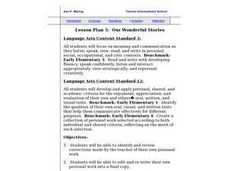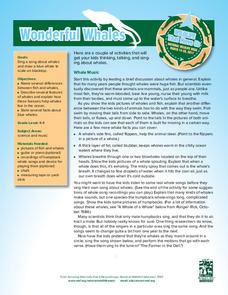Curated OER
Wonderful Wetlands
Fifth graders describe a wetland habitat and its components. They provide, in writing, at least one example of a wetland food chain, relate wetlands to ecological functions, and relate the importance of wetland functions to their own...
Curated OER
What Do You See? (Web World Wonders)
Fourth graders write paragraphs describing similarities and differences after observing two sites on Web World Wonders. They read their paragraphs to the class for critique.
Curated OER
Wonders of the World
Fifth graders investigate a famous structure. In this Wonders of the World lesson, 5th graders examine the architecture of a famous structure of the world. Students answer questions about their structure. Students gather research,...
Curated OER
Totally Awesome Answers to Wacky Wonders
Middle schoolers work with a partner to gather information on a question from two sources using a computer program and the Internet. They also write a report with visuals to air on closed-circuit TV for the school. Use this lesson to...
Curated OER
Social Studies Wonders: An Exploration
Help middle schoolers conduct Internet research and develop a working definition for the discipline of social studies. From a list of websites, they develop classification skills and differentiate between primary and secondary sources....
Global Oneness Project
Architectural Wonders
Angkor Wat, a UNESCO World Heritage Site located in Cambodia, is the focus of a lesson that asks class members to consider factors that could result in the destruction of these archeological treasures. Pupils listen to a lecture on the...
Royal Society of Chemistry
Aspirin—The Wonder of Medicine
What do aspirin and the willow tree have in common? Scholars of chemical synthesis engage in a fascinating reaction to make their own aspirin samples. The lab uses thin layer chromatography analysis, includes stoichiometric calculations,...
Curated OER
Wetlands Are Wonderful
Students study the characteristics of wetlands. They are introduced to terms and different examples of wetlands. The hands-on activity reinforces the different parts of the wetlands, and provides a working model of a wetland.
Curated OER
The Wonders of Water - Biology Teaching Thesis
Students name 3-5 aesthetic values of the Potomac River. They state the importance of water in their own words. Students describe what Earth Day is and why it is important. They list 5-7 ways that they can help minimize water pollution.
Curated OER
From Sheep to Rug
Ever wonder where wool comes from? How it is used to make a woven rug? Introduce the Native American craft of rug making to your preschool or kindergarten class with a discussion. Learners examine and discuss images of a Native American...
Curated OER
Seven Wonders of the World: The Great Pyramids
Students explore the Great Pyramids. In this lesson on Egyptian culture, students use primary sources to examine Egyptians. Students will design and draft blue prints of their own pyramid.
Curated OER
Great Monuments of the World
High schoolers explore the wonders of the world through inquiry. In this world monuments lesson, students investigate famous landmarks around the world as they conduct and apply research. High schoolers create products that feature their...
Curated OER
Bunyans Lesson Plan
Students practice their map skills. In this early childhood lesson plan, students use a map of the United States and identify the location of several natural wonders included in the book The Bunyans by Audrey Wood.
Curated OER
Winter Weather Wonders
Students are taught that precipitation comes in many different forms such as rain, freezing rain, sleet, snow, or hail. They research when and why different forms of precipitation fall in temperate climates. Students demonstrate their...
Curated OER
Sense of Wonder, Part 1
Students engage in an activity by using a leading question. They increase awareness for the wonders that are part of the real world. This is based upon personal observations that students make.
Curated OER
The Seven Wonders of the World: The Statue of Zeus at Olympia
Students explore the culture of classical Greece by examining The Statue of Zeus at Olympia. In this Seven Wonders of the World lesson plan, students will expand their understanding of Greek mythology, the Olympics and the Greek Isles....
Curated OER
KWL Chart: Know, Wonder, Learned
For this reading worksheet, students learn to use the KLM method of reading for information. Students choose a topic and use this chart to note what they know, wonder and learned about the topic.
Curated OER
The Wonderful Pigs of Jillian Jiggs
First graders read, The Wonderful Pigs of Jillian Jiggs, and create a pig with unique characteristics. In this story book lesson, 1st graders write a description of their created pig after they have completed their art project.
Curated OER
Our Wonderful Stories: Lesson Plan 5
The fifth installment in a writing unit that culminates with a Hyperstudio illustrated group story project, this plan is ripe with ideas for ways to design group writing projects for elementary writers. Use the whole unit as a base from...
Curated OER
The Wonderful World of Escher
Bridging art and math can be as easy as making tessellations. The art, context, and life of M.C. Escher is explained to the class, as is the concept of tessellations. After a bit of art history, pupils get out the ruler, tape, and...
Curated OER
Wonderful Whales
Primary marine biologists consider the largest living animals on Earth, the whales. Introduce them to general anatomy, unique adaptations, and behaviors. Teach them to sing a song that will help them remember some of these facts....
EngageNY
Notices and Wonders of the Second Stanza of “If”
Here is an instructional activity that asks pupils to analyze poetry and sparks discussion about two different types of texts: asking how is the poem, If by Rudyard Kipling alike and different from the story, Bud, Not Buddy by...
EngageNY
Notices, Wonders, and Vocabulary of the Third Stanza of “If”
How does one's experience reading a poem's text differ from listening to its audio version? Delve into the insightful question with the poem, If by Rudyard Kipling, as pupils compare and contrast their experience using a note-taking...
National Woman's History Museum
Women of Wonder: Who Do I Admire?
Celebrate superwomen during Women's History Month with a lesson that showcases a variety of female role models. Following a whole-class discussion on superheroes, role models, respect, and admiration, scholars listen to several...
Other popular searches
- Alice in Wonderland
- Wonderful Worms
- Its a Wonderful Life
- Fantasy Alice in Wonderland
- Seven Wonders of the World
- Seven Wonders
- Wonders of the World
- Alice in Wonderland Math
- 7 Wonders of the World
- Willie's Wonderful Pet
- I Wonder Bookmark
- Drama Alice in Wonderland

























